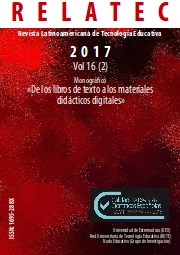Building Open Policy through Open Educational Resources: An analysis of the Open University of Brazil System
DOI:
https://doi.org/10.17398/1695-288X.16.2.161Keywords:
Policy Analysis, Distance Education, Higher Education, Open Universities, Educational TechnologyAbstract
Abstract: Open Educational Resources (OER) and associated practices are often positioned as catalysts in increasing equality, inclusion and access to higher education. We present an investigation on the production and dissemination of educational resources at eight Higher Education Institutions that are part of the Open University of Brazil System. Through interviews, focus groups and an analysis of published documents, we aimed to understand their track record, activities and perspectives in regards to core elements of OER adoption. We identified an overall interest and willingness to share resources, collaborative practices and informal exchange of resources, the use of open licensing in local repositories, and attempts at institutional policy making surrounding OER. On the other hand, there were difficulties related to the limited institutionalization of UAB and of distance education, limited financial and technical mechanisms for collaboration and reuse, and a lack of institutional and governmental policy to support sharing and reuse. The lack of coordination around these practices has meant much informal and isolated practices. Unless fomented by the federal government, most initiatives are local, many of which, short-lived. We finalize by discussing recent activities promoting openness including a central standard licensing scheme, mechanisms for sharing resources, and professional development around openness.
Downloads
References
AUTOR. (ANO). TÍTULO.
Branco Junior, S. V. (2014). Análise da Lei de Direitos Autorais Brasileira – Sistema Universidade Aberta do Brasil. Brasília: CAPES. Recuperado de: https://itsrio.org/wp-content/uploads/2015/07/Consultoria-cc.pdf
Cobo, C. (2013). Exploration of Open Educational Resources in Non-English Speaking Communities. International Review of Research in Open and Distance Learning, 14(2), 106–128.
AUTOR. (ANO). TITULO.
Craveiro, G., Machado, J., & Ortellado, P. (Orgs.). (2008). O mercado de livros técnicos e científicos no Brasil: Subsídio público e acesso ao conhecimento. São Paulo: GPOPAI. Recuperado de http://www.forum-global.de/jm/2008-2009/Relatorio%20Livros-portugues.pdf
Declaração da Cidade do Cabo. (2007). Declaração de Cidade do Cabo para Educação Aberta: Abrindo a promessa de Recursos Educativos Abertos. Recuperado de http://www.capetowndeclaration.org/translations/portuguese-translation
Declaração REA de Paris. (2012). UNESCO. Recuperado de http://www.unesco.org/new/en/communication-and-information/access-to-knowledge/open-educational-resources/what-is-the-paris-oer-declaration/http://www.unesco.org/new/fileadmin/MULTIMEDIA/HQ/CI/CI/pdf/Events/Portuguese_Paris_OER_Declaration.pdf
Ferreyra, D. (2015). Hacia una red latinoamericana de recursos educativos abiertos (REA). RELPE. Recuperado de http://www.relpe.org/wp-content/uploads/2015/12/Hacia-una-red-latinoamericana-de-recursos-educativos-abiertos-REA.pdf
Fornari, A., & Silva, H. O. da. (2017). Manifestos do ESUD: Ferramenta para elaboração de políticas públicas na EaD. Revista EmRede, 3(2), 184–196.
Fundación Karisma. (2014). Gasto público en la educación de América Latina: ¿Puede servir a los propósitos de la
Declaración de París sobre los Recursos Educativos Abiertos? Montevideo: UNESCO. Recuperado de http://www.unesco.org/new/fileadmin/MULTIMEDIA/FIELD/Montevideo/pdf/CDCI1-Karisma-EN.pdf
Glennie, J., Harley, K., & Butcher, N. (2012). Introduction: Discourses in the Development of OER Practice and Policy. In J. Glennie, K. Harley, N. Butcher, & T. van Wyk (Orgs.), Open educational resources and change in higher education: Reflections from practice (p. 1–12). Vancouver: COL.
Guri-Rozenblit, S. (1993). Differentiating between distance/open education systems-parameters for comparison. International Review of Education, 39(4), 287–306.
Hodgkinson-Williams, C., Paskevicius, M., Cox, G., Shaikh, S.,
Czerniewicz, L., & Lee-Pan, S. (2013). 365 Days of Openness: The Emergence of OER at the University of Cape Town. In R. McGreal, W. Kinuthia, & S. Marshall (Orgs.), Open Educational Resources: Innovation, Research and Practice (p. 33–46). Vancouver: Commonwealth of Learning.
Knox, J. (2013). Five critiques of the open educational resources movement. Teaching in Higher Education, 18(8), 821–832.
Lane, A., & McAndrew, P. (2010). Are open educational resources systematic or systemic change agents for teaching practice? British Journal of Educational Technology, 41(6), 952–962.
Mutzig, J. M. G. (2015, outubro). Sistema UAB: IES, cursos e polos. Apresentado em 8a reunião ordinária do Fórum Nacional de Coordenadores UAB, Brasília, DF.
Nikoi, S., & Armellini, A. (2012). The OER mix in higher education: purpose, process, product, and policy. Distance Education, 33(2), 165–184.
Olcott Jr, D. (2012). OER perspectives: emerging issues for universities. Distance Education, 33(2), 283–290.
Preti, O. (2009). Educação a distância: fundamentos e políticas. Cuiabá: EdUFMT. Recuperado de 978-85-61819-66-8
Rodrigues, R. S., Taga, V., & Vieira, E. M. F. (2011). Repositórios Educacionais: Estudos preliminares para a Universidade Aberta do Brasil. Perspectivas em Ciência da Informação, 16, 181–207.
Rossini, C., & Gonzalez, C. (2012). REA: O debate em política pública e as oportunidades para o mercado. In B. Santana, C. Rossini, & N. D. L. Pretto (Orgs.), Recursos Educacionais Abertos: Práticas colaborativas e políticas públicas (p. 35–70). São Paulo: Casa da Cultura Digital/Edufba.
UNESCO/COL. (2011). Guidelines for Open Educational Resources (OER) in Higher Education. Vancouver: COL. Recuperado de http://www.col.org/resources/publications/Pages/detail.aspx?PID=364
Weller, M. (2015). MOOCs and the silicon valley narrative. Journal of Interactive Media in Education, 2015(1). Recuperado de http://jime.open.ac.uk/articles/10.5334/jime.am/
Wolfenden, F. (2012). OER Production and Adaptation through Networking across Sub-Saharan Africa: Learning from TESSA. In J. Glennie, K. Harley, N. Butcher, & T. van Wyk (Orgs.), Open educational resources and change in higher education: Reflections from practice (p. 91–106). Vancouver: COL.
Downloads
Published
Issue
Section
License
Authors who publish in this journal accept the following conditions:
1. The Author retains copyright in the article. Upon acceptance of the article, the author shall grant to the Publisher the right of first publication of the article. with the dcoument registered with the Creative Commons Attribution-NonCommercial-NoDerivative 4.0 International (CC BY-NC-ND) license, which allows to third parties to use what is published whenever they mention the authorship of the work and the first publication in this journal.
2. Authors can make other independent and additional contractual agreements for the non-exclusive distribution of the article published in this journal (eg, include it in an institutional repository or publish it in a book) provided they clearly indicate that the work was published for the first time in this journal.
3. Authors are allowed and recommended to publish their work on the Internet (for example on institutional or personal pages) before and during the review and publication process, as it can lead to productive exchanges and a greater and faster diffusion of published work (see The Effect of Open Access).









